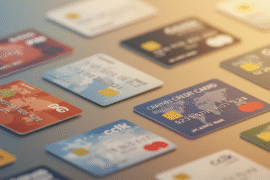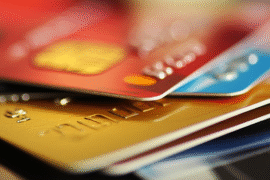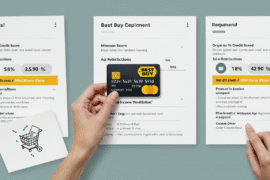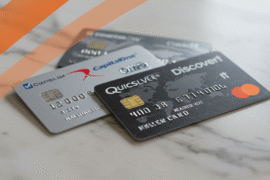This article may contain references to products or services from one or more of our advertisers or partners. We may receive compensation when you click on links to those products or services. Nonetheless, our opinions are our own.
The information presented in this article is accurate to the best of our knowledge at the time of publication. However, information is subject to change, and no guarantees are made about the continued accuracy or completeness of this content after its publication date.
- Managing Debt for Financial Peace
- Debt Breakdown and Assessment
- Budgeting to Regain Financial Control
- Repayment Methods to Reduce Debt
- Helpful Tools for Debt Management
- Financial Planning After Debt
- Celebrating Financial Milestones
- Wrapping Up Debt Management Plans
-
Frequently Asked Questions
- What are the first steps I should take to understand my debt?
- How can I prioritize my debts effectively?
- What strategies are effective for reducing my monthly payments?
- Should I consider working with a credit counseling service?
- How can I avoid accumulating more debt while managing existing debt?
- What role does mental health play in debt management?
- How can I celebrate milestones in my debt repayment journey?
- Recommended Reads
Managing Debt for Financial Peace
Dealing with debt doesn’t have to be overwhelming. With the right strategies, tools, and mindset, you can take control of your finances and reduce stress. Whether you’re managing student loans, credit card debt, or medical bills, this content will help you through your financial obligations and regain peace of mind.
Debt Breakdown and Assessment
To take control of your debt, the first step is to understand your financial situation. Begin by taking a comprehensive inventory of all your debts. Categorize them based on type, such as
- Credit Card Debt
- Student Loans
- Personal Loans
- Medical Bills
- Mortgage or Rent Arrears
This clarity will help you assess how much you owe, the interest rates attached, and the deadlines for payments. With this information in hand, you’ll be ready to make informed decisions about how to tackle your debt.
Sample Debt Overview
| Debt Type | Total Owed | Interest Rate | Minimum Monthly Payment |
|---|---|---|---|
| Credit Card | $2,500 | 18% | $100 |
| Student Loan | $15,000 | 5% | $150 |
| Personal Loan | $5,000 | 10% | $200 |
Knowing what you owe can feel like a weight lifted. It empowers you to make smarter decisions, such as choosing which debts to prioritize based on interest rates or the total amount owed. With a clear picture of your debt, you can create a plan that fits your financial goals and helps you regain control.
Budgeting to Regain Financial Control
A well-structured budget is essential for managing debt effectively. Begin by evaluating your income and expenses. Track your spending for at least a month to identify where your money is going. This includes both fixed costs (like rent and utilities) and variable costs (like groceries and entertainment). Once you know your expenses, you’ll be able to cut unnecessary spending and allocate more funds towards debt repayment.
Tips for Creating a Personal Budget
- Set realistic goals: Determine how much you can comfortably allocate towards debt repayment each month without sacrificing your essential needs.
- Prioritize debts: Rank your debts from smallest to largest or focus on the ones with the highest interest rates first—whichever strategy suits you best.
- Emergency fund: Set aside a small amount for unexpected expenses to prevent future debt accumulation.
Sample Budget Overview
| Category | Estimated Monthly Cost | Actual Monthly Cost |
|---|---|---|
| Housing | $1,200 | $1,200 |
| Utilities | $200 | $180 |
| Groceries | $300 | $350 |
| Transportation | $150 | $120 |
| Debt Repayment | $400 | $400 |
Managing debt is easier when you actively work with your budget every month. The goal is to create a long-term financial plan that gives you power rather than making you feel limited.
Repayment Methods to Reduce Debt
Once you have your debt inventory and budget in place, it’s time to prioritize repayment. The two most popular strategies are
- Avalanche Method: Pay off the highest interest rate debts first, which reduces the amount of interest you pay over time.
- Snowball Method: Focus on paying off the smallest debts first for quick wins and motivation.
Both methods are effective; it’s up to you to choose the one that best aligns with your behavior and financial goals. The key is to stick with it and make consistent progress.
Debt Prioritization Example
| Debt Type | Balance | Interest Rate | Priority |
|---|---|---|---|
| Credit Card | $3,500 | 20% | High |
| Personal Loan | $5,000 | 10% | Medium |
| Student Loan | $15,000 | 5% | Low |
Voted "Best Overall Budgeting App" by Forbes and WSJ
Monarch Money helps you budget, track spending, set goals, and plan your financial future—all in one app.
Get 50% OFF your first year with code MONARCHVIP
Helpful Tools for Debt Management
There are many tools and resources that can make managing your debt easier:
- Nonprofit credit counseling services: These organizations can offer personalized advice and develop a plan tailored to your needs.
- Online communities: Hearing from others who are facing similar challenges can offer emotional support and practical tips.
- Apps: Use tools like Mint or YNAB (You Need a Budget) to track your spending and create a realistic budget.
- Spreadsheets: A DIY approach for those who prefer tracking their expenses manually.
- Debt payoff calculators: Visualize how long it will take to pay off your debt and the impact of increasing your monthly payments.
Books, blogs, and workshops about personal finance can also help you learn more and feel more confident. Surrounding yourself with a supportive community will keep you motivated and accountable.
Financial Planning After Debt
Managing your debt doesn’t have to feel precarious. Start by understanding where you stand financially and make informed, strategic choices. By prioritizing high-interest debts, creating a budget, and building an emergency fund, you can set yourself up for financial success.
Summary of Debt Overview
| Debt Type | Amount Owed | Interest Rate | Minimum Payment |
|---|---|---|---|
| Credit Card | $2,000 | 20% | $50 |
| Personal Loan | $5,000 | 12% | $150 |
| Student Loan | $10,000 | 5% | $100 |
Your financial future starts now. Once you tackle high-interest debts, make minimum payments on the rest, and build an emergency fund, you’ll be on your way to a financially stable future. The goal isn’t just to eliminate debt—it’s to establish a solid foundation that allows you to thrive.
Celebrating Financial Milestones
Debt management can be a long journey, but every step counts. Celebrate small wins, like paying off a specific bill or cutting unnecessary expenses. These moments of success will keep you motivated and moving forward.
Wrapping Up Debt Management Plans
Debt can be intimidating, but with the right strategies, tools, and mindset, it’s manageable. Start by understanding your debt landscape, creating a realistic budget, and choosing a repayment plan that aligns with your goals. Take advantage of helpful resources like financial apps, credit counseling, and supportive communities. Most importantly, celebrate your progress along the way. With persistence and the right approach, you’ll build a more stable, confident, and financially empowered future.
Frequently Asked Questions
What are the first steps I should take to understand my debt?
Start by gathering all your financial documents, including credit card statements, loan bills, and other balances. Create a list that includes the amount owed, interest rates, minimum payments, and due dates. This will give you a clear snapshot of your financial situation and help you get started.
How can I prioritize my debts effectively?
Use the avalanche method to pay off debts with the highest interest rates first, or the snowball method to tackle the smallest debts for quick wins. Choose the method that best aligns with your financial goals and personality.
What strategies are effective for reducing my monthly payments?
Consider negotiating with creditors for lower interest rates or new repayment terms. Debt consolidation or transferring credit card balances to a 0% APR card can also help reduce your interest burden and lower monthly payments.
Should I consider working with a credit counseling service?
Yes, reputable nonprofit credit counseling services can help you create a budget, provide financial education, and set up a debt management plan tailored to your needs. Be sure to verify the legitimacy of the service before proceeding.
How can I avoid accumulating more debt while managing existing debt?
Stick to a disciplined budget, prioritize essential spending, and avoid impulse purchases. Consider using cash or debit cards instead of credit to control spending. Building an emergency fund will also prevent you from relying on credit for unexpected expenses.
What role does mental health play in debt management?
Debt can cause significant emotional strain. It’s important to prioritize mental health alongside financial health. Practice self-care, stay physically active, and consider speaking with a counselor or support group to manage the stress of debt.
How can I celebrate milestones in my debt repayment journey?
Celebrate small achievements, such as paying off a debt or sticking to your budget for a full month. Your reward doesn’t need to be expensive—small gestures, like enjoying a favorite meal or taking a break, can help boost morale and maintain long-term motivation.

Reviewed and edited by Albert Fang.
See a typo or want to suggest an edit/revision to the content? Use the contact us form to provide feedback.
At FangWallet, we value editorial integrity and open collaboration in curating quality content for readers to enjoy. Much appreciated for the assist.
Did you like our article and find it insightful? We encourage sharing the article link with family and friends to benefit as well - better yet, sharing on social media. Thank you for the support! 🍉
Article Title: How to Get Out of Debt in 2025: Budgeting and Repayment Strategies That Work
https://fangwallet.com/2025/08/12/how-to-get-out-of-debt-in-2025-budgeting-and-repayment-strategies-that-work/The FangWallet Promise
FangWallet is an editorially independent resource - founded on breaking down challenging financial concepts for anyone to understand since 2014. While we adhere to editorial integrity, note that this post may contain references to products from our partners.
The FangWallet promise is always to have your best interest in mind and be transparent and honest about the financial picture.
Become an Insider

Subscribe to get a free daily budget planner printable to help get your money on track!
Make passive money the right way. No spam.
Editorial Disclaimer: The editorial content on this page is not provided by any of the companies mentioned. The opinions expressed here are the author's alone.
The content of this website is for informational purposes only and does not represent investment advice, or an offer or solicitation to buy or sell any security, investment, or product. Investors are encouraged to do their own due diligence, and, if necessary, consult professional advising before making any investment decisions. Investing involves a high degree of risk, and financial losses may occur including the potential loss of principal.
Source Citation References:
+ Inspo
There are no additional citations or references to note for this article at this time.












































